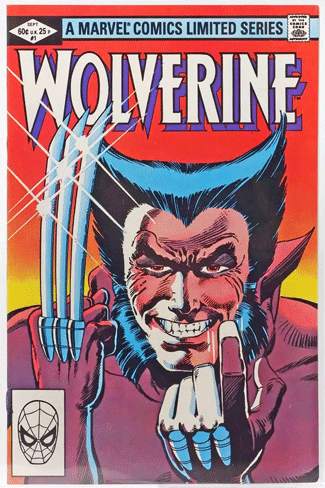Industry evolution by meteor strike
Two recent developments in the world of comic books have lessons for all businesses in the age of digital transformation.
By Brad Berens
 From the “Big Story You Haven’t Noticed” department: this month, two things happened in the world of comic books that combine to make a huge inflection point. My friend Peter Horan calls this sort of thing a “meteor strike” where “the expected only wounds you; the unexpected kills you.”
From the “Big Story You Haven’t Noticed” department: this month, two things happened in the world of comic books that combine to make a huge inflection point. My friend Peter Horan calls this sort of thing a “meteor strike” where “the expected only wounds you; the unexpected kills you.”
First, GlobalComix and Ox Eye Media announced a new joint venture: an on-demand comics printing service called GC Press:
GlobalComix has announced it will partner with Source Point Press parent company Ox Eye Media starting in 2023 to form GC Press, an on-demand comics printing service. This will be the first of its kind in the comics industry, allowing readers to purchase any comic in physical form (regardless of retail availability) and have it shipped directly to them, anywhere in the world.
Readers can’t buy Print-On-Demand (POD) issues of big publisher characters like Spider-Man, Batman, or Hellboy comics via GC Press (although I am amused by “The Scintillating Spider-Squirrel,” which seems more homage than parody). Instead, this is a niche service that enables niche writers to monetize their work via POD.
Second, the already ridiculously named DC Universe Infinite digital comics service got an even more ludicrous name for its new top level subscription: DC Universe Infinite Ultra. (What’s next? DC Universe Infinite Super Bat Ultra Plus?) For $99.99 per year, readers get digital access to DC comics one month after they hit comic book shops and the bookstores and newsstands that still carry comics. Prior to this, for $74.99 per year readers got digital access to DC comics from six months ago.
So what’s the problem? Why do these two things make a meteor strike?
It wounds the physical comics market, and it kills the collectibles secondary market.
With DC Universe Infinite Ultra, I can’t imagine buying a physical DC comic again.
I’ve been reading comics since I was five years old, stopping and starting, accumulating thousands of issues in my garage and a very patient wife along the way. Since I first subscribed to DC Universe, my physical comic book purchasing almost stopped, but not entirely. I’d buy non DC comics, and once in a while a DC series (like the various incarnations of Batman: White Knight) would so capture my heart that I couldn’t wait six months to read it.
But I can wait a month for any title. I don’t think I’m the only one.
We have seen this phenomenon before: an old analog form of distribution atrophies in the face of digital transformation, opens up production to new players, but it also kills the businesses of older players that depended on analog distribution to create moats around a value proposition. Owners of those moats mistake the nature of customer loyalty. They think the customer is loyal to a physical distribution mechanism, but really the customer is loyal to an experience. It’s not CD buyers; it’s music fans. It’s not book buyers; it’s readers. It’s not DVD collectors; it’s movie buffs who stream.
The new Ultra service will hurt comic book shops, which is where readers go to discover titles that they wouldn’t ordinarily have heard about, and which depend on the most-famous characters from the big publishers (like DC and Marvel) for a lot of their revenue.
Recently, I found my copy of Wolverine #1 from 1988 (see illustration above) in my garage:
It’s in great shape. If I sell it, then I might make a few thousand dollars. (One copy fetched $17K a while back.) That’s not bad for a 60¢ purchase 35 years ago.
This will never happen for a POD comic. The new GC Press POD service creates nice-to-have physical copies of comics you like, but these copies have no resale value. What counts as a first edition in an on-demand world? If the bigger comics publishers ever start their own POD services, then that will kill the collectibles market for new comics.
The digital transformation of comics books has already been going on for a while. My son loves the words-with-pictures format, but he reads manga and Webtoon. He only rarely buys or borrows physical comics. He is far from alone.
These moves cement my sense that comic books today are only sources of IP for movies, television, and video games, which is sad.
Why all this matters outside the world of comic books
We have seen this phenomenon before: an old analog form of distribution atrophies in the face of digital transformation, opens up production to new players, but it also kills the businesses of older players that depended on analog distribution to create moats around a value proposition.
Owners of those moats mistake the nature of customer loyalty. They think the customer is loyal to a physical distribution mechanism, but really the customer is loyal to an experience. It’s not CD buyers; it’s music fans. It’s not book buyers; it’s readers. It’s not DVD collectors; it’s movie buffs who stream.
As I’ve written elsewhere, behavior is liquid: you can pour it from one container into another. This is bad news if you’re in the container-selling business and worse if you’re in the container re-selling business.
Newspapers: as my friend and colleague Jeffrey Cole has observed many times, every time an ink-on-pulp newspaper reader dies he or she is not replaced. News organizations don’t have an audience problem; they have a revenue model problem. Americans are more interested in the news than ever before and consume more of it, but they don’t do it on ink-and-pulp. Some old newspapers have transformed to survive (The New York Times, The Washington Post), while new digitally native players arose (blogs, Buzzfeed), but many towns in the U.S. no longer have a local daily paper.
Music: a closer analog to comics is the music business. For the monthly cost of a Spotify subscription (or a willingness to listen to ads) an infinite amount of music is always at our fingertips. I have hundreds of CDs (yep, same garage), but I haven’t listened to one in years. Few people feel bad for the RIAA that waged war on digital music for decades, and more musicians can make a living (although not a Rolling Stones living) today than when the RIAA’s labels ruled, but what about the local record store where people go to learn about new music? Does the movie High Fidelity even make sense to people born after Napster?
There will never be another Beatles, Stones, Olivia Newton-John, Springsteen, Tupac, or Spice Girls, because the mass culture moats that accelerated their stardom are gone.
Likewise, although there are more new comic creators working today than ever before, and many of them are supporting themselves as artists, there will never be another Superman, Spider-Man, or Teenage Mutant Ninja Turtles.
This isn’t just because the earlier hits came first: it’s because the earlier hits didn’t have to contend with media fragmentation and ephemeral digital culture.
__________

Brad Berens is the Center’s strategic advisor and a senior research fellow. He is principal at Big Digital Idea Consulting. You can learn more about Brad at www.bradberens.com, follow him on Twitter, and subscribe to his weekly newsletter (only some of his columns are syndicated here).
See all columns from the Center.
October 19, 2022

